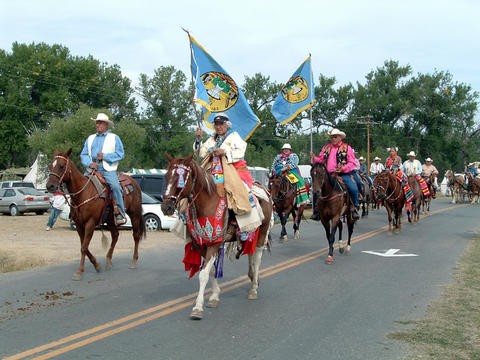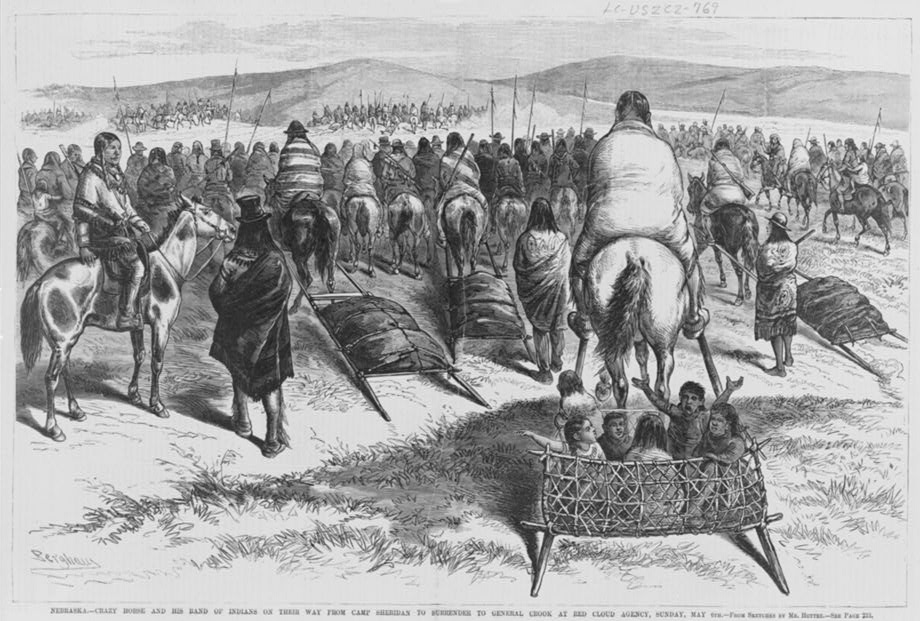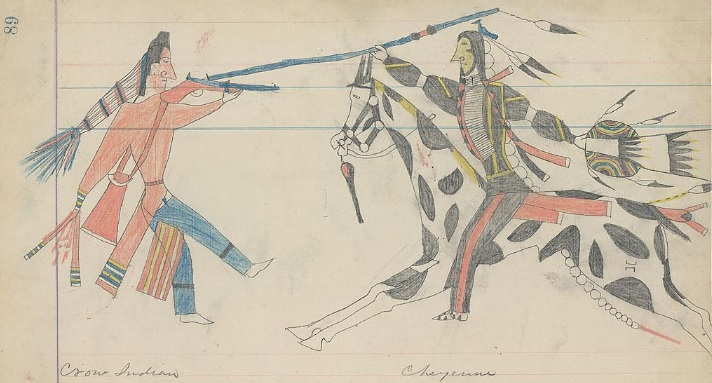|
Greg Grey Cloud
Greg Grey Cloud is a Crow Creek Nation educator, singer and activist. Grey Cloud is a co-founder of Wica Agli, a non-profit to end violence against women, children, and in general in the community. He is a notable ecologist and defender of Native American rights; gaining national attention when he sang an Honor Song in the Senate after the Keystone XL Pipeline bill was defeated, and in leading the Spirit Riders to protect the Standing Rock Reservation affected by the construction of the Dakota Access Pipeline. Activism On November 18, 2014, Grey Cloud met with Senator Tim Johnson and other lawmakers about the proposed Keystone XL Pipeline. After the narrow vote of 59-41 by senators defeating the measure, Grey Cloud stood and sang a traditional song to honor the senators. Elizabeth Warren, who had the gavel at the time of the decision, called security and had Grey Cloud and the others in the group arrested. Grey Cloud explained: "I wasn't chanting. It wasn't an outburst. It was a ... [...More Info...] [...Related Items...] OR: [Wikipedia] [Google] [Baidu] |
Crow Creek Indian Reservation
The Crow Creek Indian Reservation ( dak, Khąǧí wakpá okášpe, '' lkt, Kȟaŋğí Wakpá Oyáŋke''), home to Crow Creek Sioux Tribe ( dak, Khąǧí wakpá oyáte) is located in parts of Buffalo, Hughes, and Hyde counties on the east bank of the Missouri River in central South Dakota in the United States. It has a land area of and a 2000 census population of 2,225 persons. The major town and capital of the federally recognized Crow Creek Sioux Tribe is Fort Thompson. The town is located adjacent to the Big Bend Dam, which holds back Big Bend Reservoir (also known as Lake Sharpe), one of the four Missouri Mainstem reservoirs constructed by the US Army Corps of Engineers in the Pick-Sloan Plan. Authorized in 1944 for flood control and hydropower, the dam and lake were completed in the 1960s. History The people of the Crow Creek Sioux Tribe are mostly descendants of the Mdewakanton Dakota Tribe of south and central present-day Minnesota. They were expelled from Minne ... [...More Info...] [...Related Items...] OR: [Wikipedia] [Google] [Baidu] |
Dakota Access Pipeline Protests
The Dakota Access Pipeline Protests, also called by the hashtag #NoDAPL, began in April 2016 as a grassroots opposition to the construction of Energy Transfer Partners' Dakota Access Pipeline in the northern United States and ended on February 23, 2017 when National Guard and law enforcement officers evicted the last remaining protesters. The pipeline runs from the Bakken oil fields in western North Dakota to southern Illinois, crossing beneath the Missouri and Mississippi rivers, as well as under part of Lake Oahe near the Standing Rock Indian Reservation. Many members of the Standing Rock tribe and surrounding communities consider the pipeline to be a serious threat to the region's water. The construction also directly threatens ancient burial grounds and cultural sites of historic importance. In April 2016, youth from Standing Rock and surrounding Native American communities organized a campaign to stop the pipeline, calling themselves "ReZpect Our Water". Inspired by ... [...More Info...] [...Related Items...] OR: [Wikipedia] [Google] [Baidu] |
Native American Activists
Native may refer to: People * Jus soli, citizenship by right of birth * Indigenous peoples, peoples with a set of specific rights based on their historical ties to a particular territory ** Native Americans (other) In arts and entertainment * Native (band), a French R&B band * Native (comics), a character in the X-Men comics universe * ''Native'' (album), a 2013 album by OneRepublic * ''Native'' (2016 film), a British science fiction film * ''The Native'', a Nigerian music magazine In science * Native (computing), software or data formats supported by a certain system * Native language, the language(s) a person has learned from birth * Native metal, any metal that is found in its metallic form, either pure or as an alloy, in nature * Native species, a species whose presence in a region is the result of only natural processes Other uses * Northeast Arizona Technological Institute of Vocational Education (NATIVE), a technology school district in the Arizona portion of ... [...More Info...] [...Related Items...] OR: [Wikipedia] [Google] [Baidu] |
Living People
Related categories * :Year of birth missing (living people) / :Year of birth unknown * :Date of birth missing (living people) / :Date of birth unknown * :Place of birth missing (living people) / :Place of birth unknown * :Year of death missing / :Year of death unknown * :Date of death missing / :Date of death unknown * :Place of death missing / :Place of death unknown * :Missing middle or first names See also * :Dead people * :Template:L, which generates this category or death years, and birth year and sort keys. : {{DEFAULTSORT:Living people 21st-century people People by status ... [...More Info...] [...Related Items...] OR: [Wikipedia] [Google] [Baidu] |
Crow People
The Crow, whose autonym is Apsáalooke (), also spelled Absaroka, are Native Americans living primarily in southern Montana. Today, the Crow people have a federally recognized tribe, the Crow Tribe of Montana, with an Indian reservation located in the south-central part of the state. Crow Indians are a Plains tribe, who speak the Crow language, part of the Missouri River Valley branch of Siouan languages. Of the 14,000 enrolled tribal members, an estimated 3,000 spoke the Crow language in 2007. During the expansion into the West, the Crow Nation was allied with the United States against its neighbors and rivals, the Sioux and Cheyenne. In historical times, the Crow lived in the Yellowstone River valley, which extends from present-day Wyoming, through Montana and into North Dakota, where it joins the Missouri River. Since the 19th century, Crow people have been concentrated on their reservation established south of Billings, Montana. Today, they live in several major, mai ... [...More Info...] [...Related Items...] OR: [Wikipedia] [Google] [Baidu] |
ACLU
The American Civil Liberties Union (ACLU) is a nonprofit organization founded in 1920 "to defend and preserve the individual rights and liberties guaranteed to every person in this country by the Constitution and laws of the United States". The ACLU works through litigation and lobbying, and has over 1,800,000 members as of July 2018, with an annual budget of over $300 million. Affiliates of the ACLU are active in all 50 states, the District of Columbia, and Puerto Rico. The ACLU provides legal assistance in cases where it considers civil liberties to be at risk. Legal support from the ACLU can take the form of direct legal representation or preparation of ''amicus curiae'' briefs expressing legal arguments when another law firm is already providing representation. In addition to representing persons and organizations in lawsuits, the ACLU lobbies for policy positions that have been established by its board of directors. Current positions of the ACLU include opposing the death ... [...More Info...] [...Related Items...] OR: [Wikipedia] [Google] [Baidu] |
Standing Rock
The Standing Rock Reservation ( lkt, Íŋyaŋ Woslál Háŋ) lies across the border between North and South Dakota in the United States, and is inhabited by ethnic "Hunkpapa and Sihasapa bands of Lakota Oyate and the Ihunktuwona and Pabaksa bands of the Dakota Oyate," as well as the Hunkpatina Dakota (Lower Yanktonai). The Ihanktonwana Dakota are the Upper Yanktonai, part of the collective of Wiciyena. The sixth-largest Native American reservation in land area in the US, Standing Rock includes all of Sioux County, North Dakota, and all of Corson County, South Dakota, plus slivers of northern Dewey and Ziebach counties in South Dakota, along their northern county lines at Highway 20. The reservation has a land area of , twice the size of the U.S. State of Delaware, and has a population of 8,217 as of the 2010 census. There are 15,568 enrolled members of the tribe. The largest communities on the reservation are Fort Yates, Cannon Ball (both located in Northern Standing Rock ... [...More Info...] [...Related Items...] OR: [Wikipedia] [Google] [Baidu] |
All-terrain Vehicle
An all-terrain vehicle (ATV), also known as a light utility vehicle (LUV), a quad bike, or simply a quad, as defined by the American National Standards Institute (ANSI); is a vehicle that travels on low-pressure tires, with a seat that is straddled by the operator, along with handlebars for steering control. As the name implies, it is designed to handle a wider variety of terrain than most other vehicles. Although it is a street-legal vehicle in some countries, it is not street-legal within most states, territories and provinces of Australia, the United States or Canada. By the current ANSI definition, ATVs are intended for use by a single operator, although some companies have developed ATVs intended for use by the operator and one passenger. These ATVs are referred to as tandem ATVs. The rider sits on and operates these vehicles like a motorcycle, but the extra wheels give more stability at slower speeds. Although most are equipped with three or four wheels, six-wheel mode ... [...More Info...] [...Related Items...] OR: [Wikipedia] [Google] [Baidu] |
Crazy Horse
Crazy Horse ( lkt, Tȟašúŋke Witkó, italic=no, , ; 1840 – September 5, 1877) was a Lakota war leader of the Oglala band in the 19th century. He took up arms against the United States federal government to fight against encroachment by white American settlers on Native American territory and to preserve the traditional way of life of the Lakota people. His participation in several famous battles of the Black Hills War on the northern Great Plains, among them the Fetterman Fight in 1866, in which he acted as a decoy, and the Battle of the Little Bighorn in 1876, in which he led a war party to victory, earned him great respect from both his enemies and his own people. In September 1877, four months after surrendering to U.S. troops under General George Crook, Crazy Horse was fatally wounded by a bayonet-wielding military guard while allegedly resisting imprisonment at Camp Robinson in present-day Nebraska. He was honored by the U.S. Postal Service in 1982 with a 13¢ Great ... [...More Info...] [...Related Items...] OR: [Wikipedia] [Google] [Baidu] |
Counting Coup
Among the Plains Indians of North America, counting coup is the warrior tradition of winning prestige against an enemy in battle. It is one of the traditional ways of showing bravery in the face of an enemy and involves intimidating him, and, it is hoped, persuading him to admit defeat, without having to kill him. These victories may then be remembered, recorded, and recounted as part of the community's oral, written, or pictorial histories. Historical precedents Historically, any blow struck against the enemy counted as a coup, but the most prestigious acts included touching an enemy warrior with a hand, bow, or coup stick and escaping unharmed, and without harming the enemy, except for the enemy's wounded pride. ''Antiques Roadshow'', WGBH. Touching the first enemy to die in battle or touching the enemy's defensive works was con ... [...More Info...] [...Related Items...] OR: [Wikipedia] [Google] [Baidu] |
Water Protectors
Water protectors are activists, organizers, and cultural workers focused on the defense of the world's water and water systems. The ''water protector'' name, analysis and style of activism arose from Indigenous communities in North America during the Dakota Access Pipeline protests at the Standing Rock Indian Reservation, which began with an encampment on LaDonna Brave Bull Allard's land in April, 2016. Water protectors are similar to land defenders, but are distinguished from other environmental activists by this philosophy and approach that is rooted in an indigenous cultural perspective that sees water and the land as sacred. This relationship with water moves beyond simply having access to clean drinking water, and comes from the beliefs that water is necessary for life and that water is a relative and therefore it must be treated with respect. As such, the reasons for protection of water are older, more holistic, and integrated into a larger cultural and spiritual whole ... [...More Info...] [...Related Items...] OR: [Wikipedia] [Google] [Baidu] |
Big Oil
Big Oil is a name used to describe the world's six or seven largest publicly traded and investor-owned oil and gas companies, also known as supermajors. The term, particularly in the United States, emphasizes their economic power and influence on politics. Big Oil is often associated with the fossil fuels lobby and also used to refer to the industry as a whole in a pejorative or derogatory manner. Sources conflict on the exact makeup of Big Oil today, though the companies which are most frequently mentioned as supermajors are ExxonMobil, Chevron, BP, Shell, Eni and TotalEnergies, with ConocoPhillips frequently being included as well prior to spinning off its downstream operations into Phillips 66.The phrase "Super-Major" emanated from a report published by Douglas Terreson of Morgan Stanley in February 1998. The report foretold a substantial consolidation phase of "Major" Oil companies which would result in a group of dominant "Super-Major" entities. Big Oil previously re ... [...More Info...] [...Related Items...] OR: [Wikipedia] [Google] [Baidu] |







.jpg)